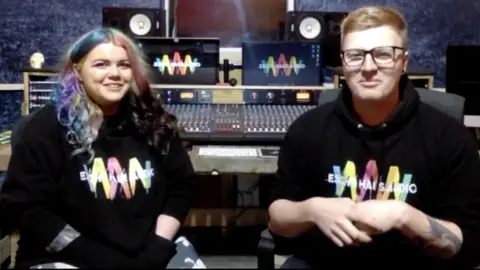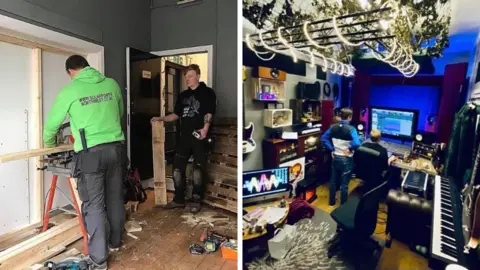Taking on the 'boys' club' of the music business
 Esche Haus Audio/Aiden Harmitt-Williams
Esche Haus Audio/Aiden Harmitt-Williams"I've made it into the industry, so why not hold the door open for someone else?"
It's a safe bet that at some point in your life, you or one of your friends has harboured dreams of working in music.
Lots of us spent our maths lessons in the back of the classroom writing lyrics, counting down the minutes until we could get home and load up Fruity Loops in preparation of a life producing music for our favourite artists.
But chances are, unless you come from a high-income background, your path into the music industry would likely hit a brick wall at some point.
Young people from higher income backgrounds are significantly more likely to be earning from music than people from lower income backgrounds, even if they studied music at school or university, according to a report from national charity Youth Music.
For low-income women the gap is even greater.
But Youth Music's research suggests that people with ambitions of forging a career in music are finding their own ways in.
Promoter Alexandra Ampofo says she's never got "any music job without knowing someone who's already at the company".
"It's an old boys' club. It's a gentlemen's club - and that needs to change," the 26-year-old tells Radio 1 Newsbeat.
 Alex Ampofo
Alex AmpofoThe promoter has pulled together tours for huge musicians like SiR and Goldlink in the past year in her job at Metropolis Music, part of Live Nation.
But "if it wasn't for my friend who was already at the company I work at now reaching out to me, I might not be in the position I am now," she says.
That's why Alex, who started making contacts in the industry via bar work at music venues, co-founded Women Connect.
She hopes it can bridge the gap by helping young women from marginalised groups and lower-income backgrounds to connect with industry figures and learn about the jobs that can lead to sustainable careers.
They link people up with work experience and Alex says she's applied for jobs on behalf of hundreds of people.
"Rarely you get a call back - usually they've actually filled the role already but legally they have to advertise it," she says.
Alex says there's a "lack of information" about jobs that are available in the music industry - something backed up by the report.
 Captured By Joy
Captured By JoyMost people wanting to work in music are hoping to make it as artists, according to Youth Music - jobs that are few and far between.
But there's "a wide range of new roles which didn't exist two decades ago" beyond performing, thanks to growth in the UK music industries, the charity says.
Its report suggests that schools are "unaware of the breadth of career paths available" in the UK music industries, meaning school leavers are too.
Alex says she had no idea how to access a career in music, something she says is the one thing that "feeds her soul".
"There was a real lack of education," she says.
'I see them experience a show I put together'
Music promotion is her perfect career - the job involves figuring out the budget for an artist's tour, booking the venues, sorting out the ticket prices and getting a guestlist together.
"You're going to get to meet the person and get to know the person and they're gonna know that you're the person that brought their dream to life as well," she says.
A big pull is how much of the work is behind the scenes.
"How you can be at Shepherds Bush Empire walking around and this is something that you put together but you don't have to have the light shone on you? I just think that's really nice.
"I'm able to see first-hand people's faces and how they're experiencing the show that I put together. And they have no idea it's me. I love that."
Imogen Storey and James Duckworth, two members of the band Novustory, are a bit more used to being centre stage.
They've had festival slots, they're being played on local and some national radio, and they're involved in a campaign for BT TV. But the work they're doing behind the scenes is maybe more important.
When we speak to them in early July they're sitting in a converted ballroom in the centre of Blackburn.

It's a building they've been renting since the start of March.
And despite the coronavirus pandemic shutting down normal life in the UK just a few weeks later, they're surrounded by new equipment and speakers, wearing matching hoodies bearing their company's logo.
The recording studio they've been dreaming about and working on is now fully formed.
The pair, who are 25 and 23, make up Esche Haus Audio - a recording studio in the north of England set up to help combat the "many stone walls that you come up against" when you've got ambitions of working in the music industry.
"We've encountered so many sharks along the way in music, we wanted to be able to almost offer a safe place where you get in what you put out," says Imogen.
But they offer more than just somewhere to record.
 Esche Haus Audio
Esche Haus Audio "You're paying so much money to go into the studio.
"We have one lad who's 15. He goes out busking and as soon as he makes enough money, he records so he can sell it while he's busking, to make more money so he can come back to the studio.
"He's not got a pot of money to waste… so we want people to have the full package.
"You come under our wing and you get a really good quality recording, we can sort you with music videos, we can sort you with people who can do your graphic design for your logos, we can sort you with band merch, we can help with your social media."
"We can organise a package that brings the cost down," James adds.
'The model is broken'
They're the kind of business eligible to apply for Youth Music's £2m incubator fund of up to £30,000, designed to help open up sustainable careers in music for 18 to 25 year olds.
The creative industries are at risk due to coronavirus - with live music particularly affected - but the charity's CEO Matt Griffiths says in the wake of the virus the music industry has a "real opportunity" to make change.
"We must use the upheaval and challenges of 2020 as a springboard to hit reset on the music industry and fling open the doors," he says.
"The existing music industry model is broken and there's a new one up for grabs."
He's calling on the industry's biggest companies to overhaul their recruitment policy to ensure better representation across the industry, end unpaid internships and form better relationships with the music education sector.
"This seminal moment presents us with a real opportunity to not only reflect but to act.
"We know there's a deep desire for transformation across the grassroots of the music industries.
"By working together, individually and collectively, we can create the change that's being loudly called for."


